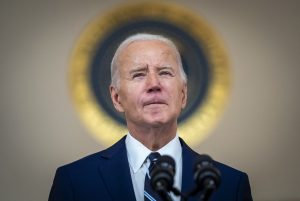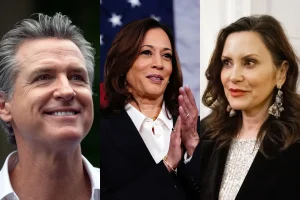Opinion: Who Should Replace Joe Biden as the Democratic Nominee If He Can’t Run?
Opinion pieces are often subjective, leading to a diverse array of suggestions. In the hypothetical situation where Joe Biden can’t run, my personal choice for his replacement would be Kamala Harris. As the current Vice President, she has demonstrated resilience, intelligence, and political savvy. Being a woman of color, she also represents the diverse demographic that makes up America. Her experience as a prosecutor and her time spent in the Senate has equipped her with a deep understanding of the country’s issues and the political landscape. She’s shown herself to be a staunch advocate for civil rights, healthcare reform, and climate change. Proven by her historic run as Vice President, she has the capability to break barriers and lead the Democratic Party in a new direction. However, she is not without competition. Elizabeth Warren, with her progressive policies and focus on economic inequality, could also be a strong contender.
Her plans for universal healthcare, affordable higher education, and financial regulation resonate with many within the party. Another potential candidate is Pete Buttigieg, who brings a fresh perspective as a young, openly gay politician. His focus on modernizing infrastructure, improving mental health care, and addressing climate change could appeal to a younger demographic. Some might also argue for Bernie Sanders, who has a dedicated following due to his focus on income inequality, universal healthcare, and free tuition at public universities. However, his more socialist-leaning policies might not appeal to the broader electorate. Overall, the Democratic Party has several qualified potential nominees, each bringing their unique perspectives and policy priorities to the table. While my personal choice would be Kamala Harris, it will ultimately be up to the party’s delegates to decide who would best represent the Democratic Party in a presidential election.

Wes Moore: A New Face for the Democratic Ticket?
Wes Moore, the charismatic former CEO of the Robin Hood Foundation, has recently emerged as a potential candidate to give the Democratic Party a fresh and invigorating perspective. With his impressive credentials that span across a myriad of sectors such as finance, nonprofit and military, Moore’s candidature could potentially bring a dynamic shift to the political landscape. Notably, his service as a Rhodes Scholar at the University of Oxford and a paratrooper in the elite 82nd Airborne Division of the US Army reflects his commitment to public service and intellectual prowess. His leadership at Robin Hood, one of the largest antipoverty organizations in the US, further illustrates his dedication to social justice and equity.
His accomplishments extend beyond his professional career; his memoir, “The Other Wes Moore”, is a New York Times bestseller that explores the divergent paths of two kids with the same name living in the same city. Moore’s background as an advocate for education and economic equality aligns with the Democratic Party’s values, making him a potential asset for the ticket. His dynamic approach of blending pragmatism with idealism could breathe new life into the Democratic Party and attract a wider range of voters. However, it remains to be seen whether Moore’s relative inexperience in the political arena would be a boon or a bane. Nevertheless, his unique blend of leadership, commitment to service, and passion for social justice presents an interesting and innovative potential choice for the Democratic ticket.
Josh Shapiro: Could He Be the Ideal Replacement for Biden?
Josh Shapiro, currently serving as the Attorney General of Pennsylvania, has been making waves in the political world, and some consider him to be an ideal replacement for President Joe Biden. With a strong track record in public service, Shapiro’s appeal lies in his ability to approach problems with a pragmatic and solution-oriented mindset. His tenure as the top official in Pennsylvania has been marked by acts that promote fairness, justice, and equity, which aligns with the Democratic party’s core values. Furthermore, his effective handling of controversial issues has showcased his capability to navigate through tumultuous political waters.
Shapiro’s potential as a leader extends beyond his political acumen. His empathetic nature, combined with his firm commitment to the principles of democracy, has earned him the respect of his peers and the public alike. His ability to connect with people on a personal level and his willingness to listen to their concerns might be exactly what the country needs in its future leader.
Moreover, Shapiro’s ability to make difficult decisions under pressure and his commitment to transparency have earned him a reputation as a trustworthy official. He is seen as someone who can be trusted to protect the interests of the people, even when facing tough opposition.
In a political climate where confidence in leadership is crucial, Shapiro’s record of consistent, effective governance could make him an appealing choice for those looking for a Biden replacement. His blend of empathy, leadership, and commitment to democratic principles creates a compelling case for his potential as a future president. However, only time will tell whether Shapiro will rise to the occasion and take on the challenge of leading the nation.
Kamala Harris: Is She the Best Choice to Lead the Democratic Party?
Kamala Harris is a significant figure in the Democratic Party, and many consider her a strong candidate to spearhead the party’s endeavors. Her extensive experience in public service, including her tenure as the Attorney General of California and a U.S. Senator, has endowed her with a profound understanding of the political landscape. She has consistently championed progressive policies on a wide range of issues, from climate change to healthcare, demonstrating her commitment to the principles that underpin the Democratic Party. Yet, there is a degree of controversy surrounding her potential leadership within the party.

Critics argue that her prosecutorial history may not resonate with the more liberal faction of the party, fearing that it could alienate some voters. Furthermore, her stance on certain issues has changed over time, leading some to question her consistency. Despite these concerns, Harris’s formidable political acumen, resilience, and ability to connect with a diverse electorate suggest she could be a compelling choice to lead the Democratic Party. Her historical significance as the first female Vice President of South Asian and African American descent also stands to invigorate the party’s appeal to a broad demographic. The question of whether she is the ideal choice ultimately depends on individual perspectives and the direction in which the party wishes to head.
Jill Biden: A Controversial but Possible Candidate
Jill Biden, wife of current U.S. President Joe Biden, is an intriguing figure who has not only stepped into the limelight as First Lady, but has also spawned discussions about a potential political future of her own. While no official announcement has been made regarding her intention to run for office, the possibility cannot be completely ruled out. Controversy surrounds this speculation primarily due to her consistent involvement in political campaigning and her ongoing influence in her husband’s administration. Critics argue that she lacks the necessary experience to hold office, pointing out her primary career as an educator rather than a politician. However, proponents of Jill Biden point to her doctorate in education, her advocacy for military families, and her work on community college partnerships as evidence of her leadership capabilities.
They also note her ability to navigate the political sphere as the wife of a former Vice President and now President. In an era when non-traditional candidates have won high office, the idea of Jill Biden as a candidate is not far-fetched. Yet, such a decision would undoubtedly spark intense debates and possibly deepen existing political divisions. It would be a historic move, marking her as one of the few First Ladies to seek office in her own right. The implications and outcomes of such a move are unpredictable, but the possibility remains as an interesting topic of conjecture. It’s a discussion that serves as a reflection of the evolving role of First Ladies and women in politics in general.
